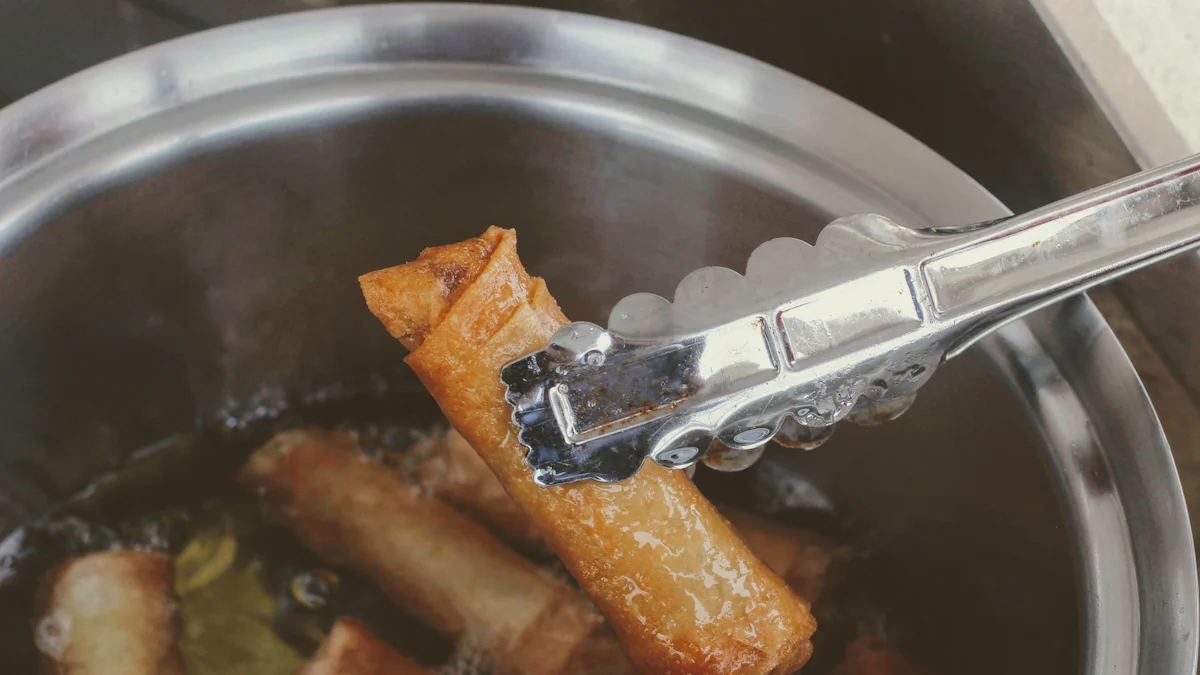The surge in air fryer popularity reflects a shift towards efficient cooking methods. With a focus on low power consumption, these appliances offer a modern solution to energy-conscious consumers. This guide aims to empower readers in optimizing their air fryer usage for minimal energy impact, aligning with the global push for sustainable practices. As households embrace eco-friendly choices, understanding how to maximize efficiency in daily tasks like cooking becomes paramount.
Understanding Air Fryer Technology

How Air Fryers Work
Air fryers operate by utilizing hot air circulation to cook food thoroughly. This method involves the distribution of heat evenly around the ingredients, ensuring a crispy texture without submerging them in oil. The process mimics deep-frying but with minimal oil, resulting in healthier meals.
Basic principles of air frying
The fundamental principle behind air frying lies in its ability to create a crispy exterior on food items using circulated hot air. By coating the ingredients lightly with oil and subjecting them to high temperatures, air fryers achieve a similar crunch to traditional frying methods without the excess grease.
Comparison with traditional frying methods
When comparing air frying to conventional frying techniques, one notable difference is the reduced oil requirement. Air fryers use significantly less oil than deep fryers or pan-frying, offering a lighter alternative for those conscious of their calorie intake. Additionally, air fryers are more energy-efficient than traditional ovens, making them an attractive option for eco-conscious individuals seeking sustainable cooking practices.
Energy Consumption in Air Fryers
Understanding the factors influencing power usage in air fryers is essential for optimizing their efficiency. Various elements impact energy consumption, including the wattage of the appliance and its cooking capacity. Moreover, being aware of typical power ratings can help users make informed decisions regarding their energy usage.
Factors affecting power usage
Several factors contribute to the overall power consumption of an air fryer, such as its wattage, cooking duration, and frequency of use. By adjusting these variables thoughtfully, users can minimize energy waste while still enjoying the benefits of this innovative cooking technology.
Typical power ratings and what they mean
The wattage of an air fryer plays a crucial role in determining its power consumption and cooking speed. Higher wattage models may heat up faster but consume more energy during operation. Understanding these ratings enables consumers to select an appliance that aligns with their energy-saving goals without compromising on performance.
Tips for Reducing Power Consumption
Choosing the Right Air Fryer
When selecting an air fryer model, consider opting for energy-efficient options that align with your sustainability goals. Look for features that promote minimal energy consumption while delivering optimal cooking results:
- Compact Size: Choose a model that suits your household needs to avoid unnecessary energy usage.
- Quick Heating: Prioritize air fryers with rapid heating capabilities to reduce overall cooking time and power consumption.
- Temperature Control: Select models with precise temperature settings to prevent unnecessary energy waste during cooking sessions.
Optimal Usage Practices
To further minimize power consumption when using your air fryer, adopt these best practices for efficient and eco-friendly cooking experiences:
- Preheating Efficiency: Preheat your air fryer only when necessary, as excessive preheating can lead to energy wastage.
- Cooking Time Management: Monitor and adjust cooking times based on recipes to prevent overcooking and unnecessary energy use.
- Batch Cooking Strategy: Utilize the full capacity of your air fryer by batch cooking meals, optimizing energy usage per session.
Maintenance and Care
Maintaining your air fryer properly not only ensures its longevity but also contributes to sustained low power consumption levels. Follow these maintenance tips for an eco-conscious approach to appliance care:
Regular Cleaning: Clean your air fryer after each use to prevent residue buildup, which can hinder its performance and increase energy consumption.
Proper Ventilation: Ensure adequate ventilation around the air fryer during operation to optimize airflow and maintain efficient heat distribution.
Comparing Air Fryers with Other Appliances

Air Fryers vs. Ovens
When comparing air fryers to traditional ovens, the differences in energy efficiency become evident. Air fryers excel in preheating quickly, cooking food faster, and utilizing less electricity during operation. This efficient use of energy sets air fryers apart from conventional ovens and stovetops, making them a favorable choice for those seeking to minimize power consumption.
Energy efficiency comparison
- Air Fryers: Preheat rapidly, reducing overall energy usage.
- Ovens: Require longer preheating times and consume more electricity during operation.
Cooking time and results
- Air Fryers: Cook food faster due to efficient heat distribution.
- Ovens: Take longer to cook dishes and may result in higher energy consumption.
Air Fryers vs. Microwave Ovens
In the realm of kitchen appliances, the comparison between air fryers and microwave ovens unveils distinct differences in power consumption and versatility. While both offer convenience, their energy profiles vary significantly, influencing usage scenarios based on individual needs.
Power consumption differences
- Air Fryers: Consume less energy compared to microwave ovens.
- Microwave Ovens: Have higher power consumption rates during cooking processes.
Versatility and usage scenarios
- Air Fryers: Provide a balance between energy efficiency and cooking versatility.
- Microwave Ovens: Offer quick heating but may not achieve the same crispiness as air-fried foods.
In summary, air fryers stand out as efficient kitchen companions, offering a healthier cooking alternative with low power consumption. By embracing energy-saving practices, users can not only reduce their environmental footprint but also enjoy quicker meal preparations. The benefits of opting for an air fryer include faster cooking times and minimized electricity usage compared to traditional ovens. Making the switch to this innovative appliance promotes sustainable living without compromising on culinary delights.
Post time: Jun-26-2024

